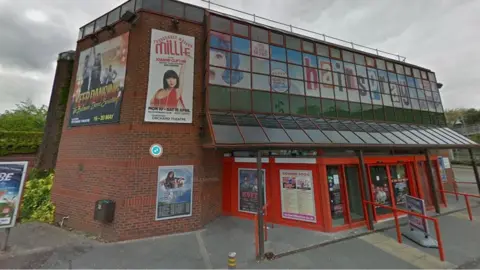Several theatres shut doors over fears about Raac concrete
 Getty Images
Getty ImagesShrek the Musical in Carlisle and gigs by comic Jimmy Carr in Northampton and Kent are among the shows to have been called off after crumbling concrete was found in a string of theatres.
Carr's tour was due to visit Dartford's Orchard theatre and Northampton's Royal & Derngate, but both venues have closed for the rest of the month.
Carlisle's Sands Events Centre is shut temporarily "for further assessments".
St David's Hall in Cardiff is also shut for at least four weeks.
The city council said it needed to "carry out intrusive surveys to further reassure ourselves and the public on the safety" of the hall.
Graham Nash, Miriam Margolyes, Lindisfarne and Adrian Edmonson were scheduled to appear there in the next month.

Venues in Solihull and Stockport have also shut while inspections take place.
They have all found reinforced autoclaved aerated concrete, known as Raac, which has affected numerous public buildings including about 150 schools in England.
Carr was scheduled to appear in Dartford on Friday, but told fans the Orchard was "closing temporarily to review the use" of the potentially unsafe concrete.
Dolly Parton tribute act Sarah Jayne was due to play there on Wednesday, but said it was "very disappointing and very sad" to be told about the closure the previous afternoon.
"As you can imagine, we were in shock, and so were probably 600 people that had purchased tickets too," she told BBC Radio Kent.
 Google Maps
Google MapsThe venue was also due to hosts events including Mike Oldfield's Tubular Bells and An Evening With Harry Redknapp later this month.
In Northampton, a run of Agatha Christie's And Then There Were None and shows by comedians including Tim Vine, Jordan Gray, Phil Wang and Carr have fallen victim to the month-long closure.
"We ask for your patience during this time, and we will be reopening as soon as we can," a statement said.
Shrek was due to visit Carlisle this week as part of the hit musical's UK tour, but the Sands Events Centre said it had shut as "a precautionary step". The centre's new main building, which includes a swimming pool and café, is unaffected.
Elsewhere, the Core theatre in Solihull, West Midlands, has closed as a precaution in order "continue our investigations", the local council said. Other parts of the building, containing a library and cafe, are still open.
But the theatre's closure scuppered a production of Little Shop of Horrors by Coleshill On Stage, which was due to open on Thursday. "We were completely devastated after five months of rehearsals," director Joyce Eyre told BBC WM.
The Forum Theatre in Romiley, Stockport, has also closed "as a precautionary measure and to ensure the safety of our staff, performers and visitors".
A statement said: "We realise this will be very disappointing to our patrons and our performers but our priority is to make sure the building is safe."
The Brunton Theatre in Musselburgh, East Lothian, closed in March and remains shut after "substantial areas" of the roof were found to have been made from Raac.
Other venues have found the concrete but said they did not need to shut.
The National Theatre in London said it had "a small number of select backstage areas where Raac is present".
A statement added: "Our structural engineers are in the process of surveying these areas, initial indications are that they are safe and do not currently require remedial works."
The YMCA theatre in Scarborough closed parts of its building on Monday but has now reopened after an inspection found it did not contain Raac.
Meanwhile, the Ambassadors Theatre Group, which operates 10 West End venues and 27 elsewhere in the UK, said it had a plan to "to closely monitor the integrity of our venues".
A spokesperson said: "We are confident that we do not have structural issues as a result of Raac, and we would like to reassure our customers that no ATG venues are affected by this issue."
Robin Townley of the Association of British Theatre Technicians told BBC News that Raac was not very suitable to be used for constructing auditoria, so "the prevalence of the system in theatre buildings will hopefully be quite limited".
However, it could be more common in "ancillary spaces" like foyers and backstage areas, he said.
Claire Walker, co-chief executive of Society of London and UK Theatre, recently told trade paper The Stage she believed the number of affected theatres "will be extremely limited".
But The Stage's Matthew Hemley told BBC Radio 4's Front Row on Tuesday that it was a major blow for those venues.
"We've just weathered Covid when so many theatres had to close their doors, and then rebuild and encourage audiences back," he said. "It couldn't really come at a worse possible time."
